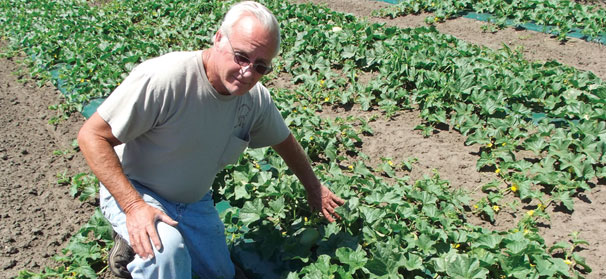

Aug 15, 2012Family, persistence, Twinkies help Ohio farm survive
When Dave Weilnau was growing up, just about every farmer in his part of north-central Ohio sold their vegetables wholesale to local buyers. That’s not the case anymore.
“As far as I know, there’s no one doing that at a wholesale level in the Milan area,” Weilnau said. “Except me.”
Take melons, for example. Milan, Ohio, is known for its annual melon festival, which attracts up to 100,000 people over Labor Day weekend. But the few melon growers left in the area have tiny plots and sell small amounts from roadside stands. Weilnau is the only one who sells to local grocery stores, he said.
How has he managed to survive? Help from his family and persistence have both played a role – even though he avoided farming for as long as he could.
Now 63, Weilnau grew up on the family farm in Milan with his two brothers. None of them stuck around – at least, not at first.
“We all ran away, because there was no money in farming,” he said. “I don’t plan on running away again.”
Weilnau came back to the farm permanently almost two decades ago, after his father passed away. He and his brothers each inherited a chunk of the family farm. They’re all still farming. Sparky grows 1,300 acres of small grains. Alan runs an organic operation.
Weilnau named his parcel Tender Shoot Farms. The name comes from a Bible passage, Isaiah 53:2, about a tender shoot growing out of a tree stump. The idea of rebirth has more than one meaning for Weilnau. He’s an alcoholic who’s been sober since 1983.
He’s also trying to bring back the community spirit he witnessed when he was a kid.
Weilnau grows on 85 acres: 35 acres of vegetables, 25 acres of popcorn, 23 acres of soybeans and some rye and vetch. Onions, squash and peppers are the only crops he irrigates. He uses county water, and the bills can be hefty. There’s a big demand for his sweet onions, but they require so much labor that it’s hard to make money on them. He also grows potatoes and asparagus, he said.
When he first came back to the farm Weilnau worked for one of his brothers for a while, but he started growing vegetables right away. He lost money the first few years. It was tough to get established, because the local networks that used to help small growers sell vegetables didn’t exist anymore. He slowly picked up customers, however, including local grocery stores, retailers and farm markets.
He also sells at farmers’ markets and has a small roadside stand. Between all that, he’s managed to survive.
Weilnau relies on a handful of local workers to help him out.
“I’ve been blessed,” he said. “Most of the guys that come here stayed at least six or seven years before they totally let go.”
In late June, Weilnau and his guys were hoeing, spraying and getting ready to clean the packing shed for sweet corn. It had been pretty dry in the area until the middle of that month, when 2 inches of rain hit and the corn jumped a foot overnight. His crops were early, but he didn’t get hurt by the spring freezes – unlike local apple and peach growers.
“We were done planting field crops by the end of April,” he said. “Last year, we were planting in June.”
As for the future of Tender Shoot Farms, that’s up in the air.
“I’m close to retirement, except I probably won’t ever retire because I like what I do,” he said.
Weilnau has two sons, but neither has shown much of an interest in farming. Neither have any of his nephews.
“I wish there was someone interested in what I’m doing,” he said. “I’d be glad to hand it down to them.”
Something else he probably wouldn’t mind handing down is a sense of “community spirit.” Weilnau has his own approach to that: Twinkies. Every workday at 10 a.m., no matter what they’re doing, he and his employees gather on his front porch for “Twinkie break.” People driving by will often pull in to eat a Twinkie, too. Sometimes two people show up, sometimes a dozen, he said.
When Weilnau was a kid, all the farmers were so poor they had to share each other’s equipment. When they started making money, however, they started buying their own equipment, and everybody went off into their own little worlds. A sense of community was lost when that started happening, he said.
If Twinkies can’t bring them back together, what can?
— Matt Milkovich
none














